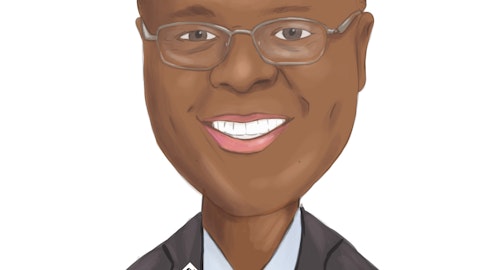Bill Dezellem: And so, help us understand either the competitive dynamics or your own individual strategy to — relative to loan yields in those categories declining when rates are generally upward biased?
David Weber: Well, I think generally, our loan yields are improving, but the negative impact of those non-accruals is what’s really weighing our average loan yields down quarter-over-quarter.
Julie Courkamp: And Bill, I think — in my comments, we were talking about the rate in September on our loan production, and it was at the highest level at 8.44%. I think, we’re generally seeing nice increases in new loan production on the rate, as well as loans are renewing and rolling at a higher rate. So we are seeing good benefit from that, but we’ve got some of these nuances with the non-accrual loan that have impacted some of those categories.
Bill Dezellem: So ultimately, the real key to this comes right back to the non-accrual?
Julie Courkamp: I think that’s the largest driver.
Bill Dezellem: Okay. Great. Thank you. And then, final question is, how are you thinking about the share buyback given that the stock price is trading roughly 70% of book value? But at the same time, we also recognize the business isn’t earning as much as it has in the past. So what’s your philosophical thought process here?
Scott Wylie: Yes. So we discuss it with the Board every quarter. And every time the stock trades down, we’re like, well, we should have stock buyback plan in place right now. But I think generally, what we have thought is, this is a good time to have a strong capital. And to the extent that there are earnings or credit or acquisition opportunities out there, having a stronger capital base is going to be beneficial for the long-term shareholder value creation here. So I think, the Board measures all those things, Bill, and tries to make the best decision in terms of how to manage our capital. And I think, we’ve talked about our improvements in our tangible book value per share without any significant buybacks and our improving capital ratios, which are already way above well-capitalized ratios.
I just would add to your question about the reporting of our yields in our interest income. I mean, we think we’re going to collect the principal and interest on these additional $42 million in loans that we put on non-accrual. So I mean that is money that we do expect to see back in the bank in the future in spite of sort of the short-term disappointment here. But we will sure talk about that again at our Board meeting in this quarter, and we’re mindful of the fact that, that’s a good way to drive EPS and trying to use our best judgment on how do you balance that against some of those other factors I talked about.
Bill Dezellem: That is helpful. Thank you all for the comments.
Scott Wylie: Thank you, Bill. Appreciate the support.
Operator: One moment for our next question. Our next question comes from Ross Haberman with RLH Investments. Your line is open.
Ross Haberman: Good morning, Scott. Scott, how are you? Could you talk about — are you seeing any other tense or weaknesses in delinquencies or slow payers or anything like that besides this one, hopefully an anomaly in terms of the bad loan, which you referred to today?
Scott Wylie: So, good morning, Ross. We are not seeing any other signs of credit deterioration. This is a one-off situation. Unfortunately, in addition to the other one-off situation that we reported last quarter, but they both are isolated cases, very different from each other. And again, from what we know today, we expect to collect fully on these things. We have now $4 million specific reserve on the $8 million credit. And again, we think we’re very well collateralized on this new issue. It’s really unfortunate timing for us that we’re 90 days past due at quarter end, but we think we’re doing the right thing in the way we handled that with the borrower and with our accounting. And obviously, it’s going to cause some short-term pain for us in terms of these conversations, but I think the fundamentals are going to be fine.
Ross Haberman: How often do you stress test, I guess, your maturing loans in terms of, all these — or many of these commercial borrowers have been borrowing at, I don’t know, 4% or 5%. And suddenly, the loans come due and they have to pay 8% plus. How often do you stress test that? And paying 4% or 5% is one thing, paying 8%, 8.5% is another thing. Do you sort of get ahead of it and say, “Hey, is this going to be — is this going to be a viable loan at 8.5%? Can they afford this type of dramatic jump up in rate?”
Scott Wylie: Yes. So a couple of things we do there. When we’re underwriting loans, originally, we do stress tests. I would tell you the traditional kind of up and down 300 basis points looks a little light compared to the 550 basis points or 575 basis points, where it’s been now over the last 18 months. But that’s something we’ve always looked at is, what would be the scenario for this borrower if we see a rising rate environment. And then, as part of our internal loan review process, we’ve gone through here over the last few months and looked at where we see risk in a portfolio for this re-pricing risk you’re talking about. And what we’ve seen is the bulk of the risk is probably a couple of years out, and is not — is minimal.
I mean, where we’ve looked at credits that are coming due or are going to come due, the borrowers do have adequate coverage to cover higher rates. So we’re not seeing that as a fundamental problem in the portfolio or with any individual credits at this point or for the foreseeable future. If rates continue to go higher, I think we’ll probably need to do a deeper dive into that. But from where we are today, that seems to be a risk that’s well managed in the portfolio.
Ross Haberman: I didn’t quite kind of tell from your handout your mortgage business, was that a breakeven for the quarter? I couldn’t quite tell from — I forgot what page it was, Page 10, in terms of your non-interest income. Was the mortgage business at a breakeven this quarter?
Scott Wylie: No. No, I think we lost — David, is that $200,000 for the quarter, I believe, in the mortgage segment.
Ross Haberman: And from what you’re seeing for the fourth quarter, will that probably be as good a guess as any for the fourth quarter as well?




